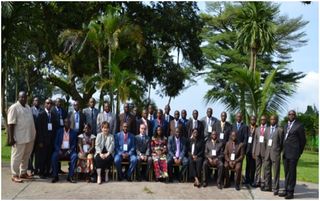Posted by Olivier Benon, Abdoulaye Touré and Marie-Christine Uguen[1]
From November 24—28, 2014, AFRITAC Central (AFC) organized a seminar in Douala, Cameroon, on rebuilding the budgetary and accounting functions of the Central African Republic (CAR). The workshop was attended by 28 finance officials from CAR’s Ministry of Finance and Budget, the Ministry of Economy and Development, several line ministries (Health, Education, Public Service, and Defense) and the central bank (BEAC).
Background and objectives
Because of the tense security situation in Bangui since 2014, AFC has been unable to deliver technical assistance (TA) in CAR, and have instead used safe havens in neighboring countries such as Cameroon. The November workshop was the first of a series of similar events dedicated exclusively to CAR officials during FY2015.
The agenda focused on budget execution and cash management and was tailored to the specific TA needs of fragile states facing poor revenue mobilization and a high demand for public spending in priority areas. One of the workshop’s objectives was to share PFM experiences in a post-crisis environment.
The workshop’s main outcomes included: (i) the identification of issues faced by officials in the preparation and implementation of the state budget, and in strengthening accounting and cash management functions; and (ii) the endorsement of an action plan of short-term measures to address these challenges.
National experience in PFM management during the crisis
The main topics discussed included: macroeconomic frameworks and economic perspectives; budget preparation and execution frameworks; tax and customs administration; control/auditing; accounting and cash management; and the implementation of a treasury single account (TSA). In each of these areas, participants from the relevant departments and line ministries presented an assessment of the current situation, the challenges being faced in moving forward, and measures proposed to address these challenges.
The presentations were followed by extensive discussions on priorities and possible approaches to address the issues identified. The AFC Resident Advisors and regional expert provided technical advice on how to maintain and operate the PFM system in a post-crisis situation, focusing mainly on the areas of budget preparation and execution, accounting, cash management, and IT system security.
How to strengthen PFM systems in the post-crisis phase
The main message delivered was that officials, to the extent possible, should implement the requirements of the legal and regulatory framework in all circumstances. Specifically, the Resident Advisors emphasized that no exceptional PFM procedures should be established during the post-crisis period, as the legal framework already offers a wide range of possibilities to manage specific issues. For example, a petty cash procedure can be used for urgent expenditures, with the appointment of a responsible manager to issue expense vouchers, or the urgent public procurement procedure applied to cover budget needs that have a high priority.
Three thematic subgroups discussed the following topics: (i) mobilization of customs and tax revenue; (ii) processing expenditures; and (iii) accounting, cash management and implementing a TSA. Participants identified a range of short-term measures that would enhance PFM management in these areas.
Recommendations and next steps
The main recommendations arising from the workshop were the following:
Improving revenue mobilization
- Closely monitor and control customs and tax exemptions;
- Enhance coordination between the customs and tax departments; and
- Strengthen collaboration with the private sector and other stakeholders.
Managing and controlling expenditures
- Develop a medium-term budget framework (MTBF) which sets annual targets for the state budget over a three-year period;
- Give particular emphasis to the MTBF for priority sectors: health, education, defense, and management of the public service;
- Ensure line ministries are actively involved in budget preparation;
- Prepare budget execution guidelines;
- Develop budget execution tools (notably procurement plans, guidance on market prices, and a financial control guide);
- Appoint an IT team and manager in charge of the development, implementation and maintenance of the PFM IT system (GESCO); and
- Prioritize the implementation of GESCO in key line ministries.
Enhancing public accounting and cash management
- Ensure budget operations are captured by GESCO on a daily basis;
- Produce the balance of accounts on a monthly basis;
- Review the revenue collection agreement between commercial banks and the government, and ensure that commercial banks provide the necessary information to support public accounting;
- Simplify the accounting of tax receipts collected by commercial banks; and
- Improve cash management, notably through regular updates of the monthly and weekly cash plan forecasts.
Next steps
During FY2016, AFC will review the implementation of the action plan and provide follow-up advice, either in Bangui or through the organization of similar workshops devoted to CAR officials.
[1] Olivier Benon is the AFC Coordinator; Abdoulaye Touré and Marie-Christine Uguen are the AFC PFM Resident Advisors.
Note: The posts on the IMF PFM Blog should not be reported as representing the views of the IMF. The views expressed are those of the authors and do not necessarily represent those of the IMF or IMF policy.






